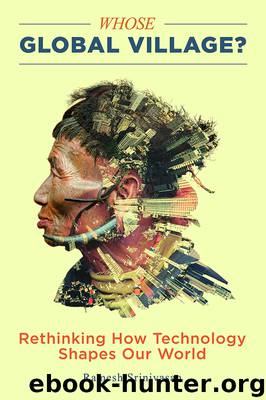Whose Global Village? by Ramesh Srinivasan

Author:Ramesh Srinivasan
Language: eng
Format: epub
Tags: SOC052000 Social Science / Media Studies
Publisher: NYU Press
One can apply the fluid ontology approach to consider nondigital environments as well. One area of intervention could be in information institutions such as museums, libraries, and archives. These institutions have long been criticized for misrepresentation, partly due to their support of objectives detached from the peoples they claim to represent. Today museums, archives, and libraries are confronting these histories and attempting to rethink their practices of representation and ownership. Particularly important is the growth of community-based approaches toward assembling, appraising, and managing archival records and collections, a potential game changer from the practice of objectification and inequality.50 This may force a radical requestioning and rejection of principles of preservation or memory, to adopt a worldview that rejects Western principles of accumulation, storage, and classification.
We must rethink the building blocks of new technology, including interfaces, databases, and algorithms, to support collaborations with diverse cultures and communities. Chilean engineer, entrepreneur, and politician Fernando Flores and his colleagues have pointed out insightfully that “technology is not the design of physical things. It is the design of practices and possibilities.”51 With these insights in mind, I turn now to the Tribal Peace technology initiative, a multiyear collaboration I had with a group of Native American reservation communities.
Download
This site does not store any files on its server. We only index and link to content provided by other sites. Please contact the content providers to delete copyright contents if any and email us, we'll remove relevant links or contents immediately.
| Anthropology | Archaeology |
| Philosophy | Politics & Government |
| Social Sciences | Sociology |
| Women's Studies |
Cecilia; Or, Memoirs of an Heiress — Volume 1 by Fanny Burney(32558)
The Great Music City by Andrea Baker(32018)
Cecilia; Or, Memoirs of an Heiress — Volume 2 by Fanny Burney(31956)
Cecilia; Or, Memoirs of an Heiress — Volume 3 by Fanny Burney(31941)
We're Going to Need More Wine by Gabrielle Union(19046)
All the Missing Girls by Megan Miranda(16026)
Pimp by Iceberg Slim(14506)
For the Love of Europe by Rick Steves(14121)
Bombshells: Glamour Girls of a Lifetime by Sullivan Steve(14075)
Talking to Strangers by Malcolm Gladwell(13370)
Norse Mythology by Gaiman Neil(13363)
Fifty Shades Freed by E L James(13240)
Mindhunter: Inside the FBI's Elite Serial Crime Unit by John E. Douglas & Mark Olshaker(9342)
Crazy Rich Asians by Kevin Kwan(9292)
The Lost Art of Listening by Michael P. Nichols(7506)
Enlightenment Now: The Case for Reason, Science, Humanism, and Progress by Steven Pinker(7313)
The Four Agreements by Don Miguel Ruiz(6765)
Bad Blood by John Carreyrou(6621)
Weapons of Math Destruction by Cathy O'Neil(6279)
